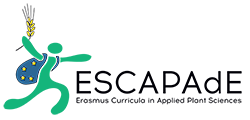Junior Research lab for Agricultural transition
The context of the course is deliberately oriented towards sustainability transitions, preserving climate, energy, natural resources, biodiversity and the environment. The module is based on the acquisition of transversal research skills and disciplinary knowledges, and their deployment on a research project since we deeply believe that providing students with the practices of a proper and ethical scientific approach will help them to think, explore, test and validate ways for the transitions needed to mitigating and adapting to the global change, whether they have the project to become professional scientists or not.
The course is an autumn semester course (September to December) for 26 ECTS. It is organized into three main types of activities:
Item i) Disciplinary courses provided through Problem-based Learning (6 ECTS). Three courses (2 ECTS each) will be chosen among a catalog of modules covering Ecology, Evolution, Water science, Economy, Biochemisty and year-to-year offers of the Institut Agro | Montpellier SupAgro and the large number of associated research units of the Agropolis and Montpellier University MUSE communities. Each course schedule will be organized on a four weeks basis. Preparing, organizing and participating in masterclasses led by expert scientists is also part of the exercise (1 ECTS)
Item ii) Full and autonomous scientific small-group research projects for more than 50% of the schedule (14 ECTS) from the acquisition of the scientific literature, definition of a tractable research question, experimental or modelization design, data acquisition / in silico programing, data analysis, writing and oral communication. When not in labs or in the field, students are located in a dedicated room on campus, the HIVE (the Highly Innovative and Versatile Environment), where they get courses but also realize their group and personal work. When necessary, research activities will be performed either in campus facilities or in research laboratories according to the themes and needs defined by the students and supervisors.
Item iii) Active learning sessions to acquire in-depth knowledge and practical skills for research (5 ECTS), including data management and analysis, in particular in R, literature management, good reproducibility practices, scientific writing and oral presentations, ethics and integrity in science and social network communication
The goal is to find a balanced experience including the learning of strong disciplinary fundamentals through Problem-based learning, while promoting the interaction and interculturality among students, learning activities dedicated to the practice of research and common masterclasses.
The semester aims to strengthen the scientific background of the students, to get them trained through real and collaborative research activities within a cohort of 3 and International students, to develop their critical sense, their scientific rigor, their creativity and their taste for innovation and research while developing the systemic and multidisciplinary vision that characterizes engineers in the 3 Grande Ecole assertion (equivalent to MsC).
Cooperative learning
The evaluation of Grades is based on (i) the evaluation of the acquisition of disciplinary knowledge on the basis of problem solving (23%), (ii) evaluation of the student implication and preparation of masterclasses (4%) (iii) good scientific practices as evaluated throughout the research project (literature survey, data management, analysis reproducibility, scientific networking etc..) (19%), (iv) an individual oral communication (16%) (v) the collaborative writing of a scientific article 26%) (vi) an individual peer-review exercise (12%).
Start date: 06-09-2021
End-date 1: 17-12-2021
(26 ECTS)
